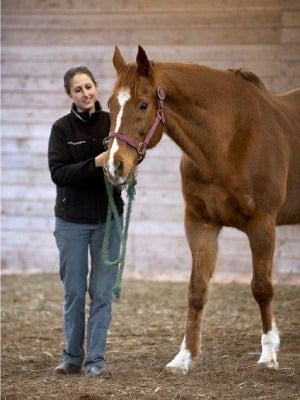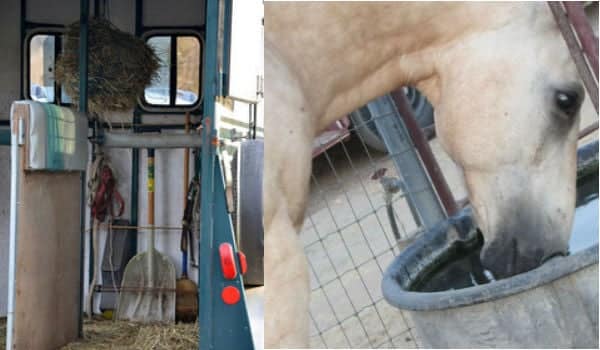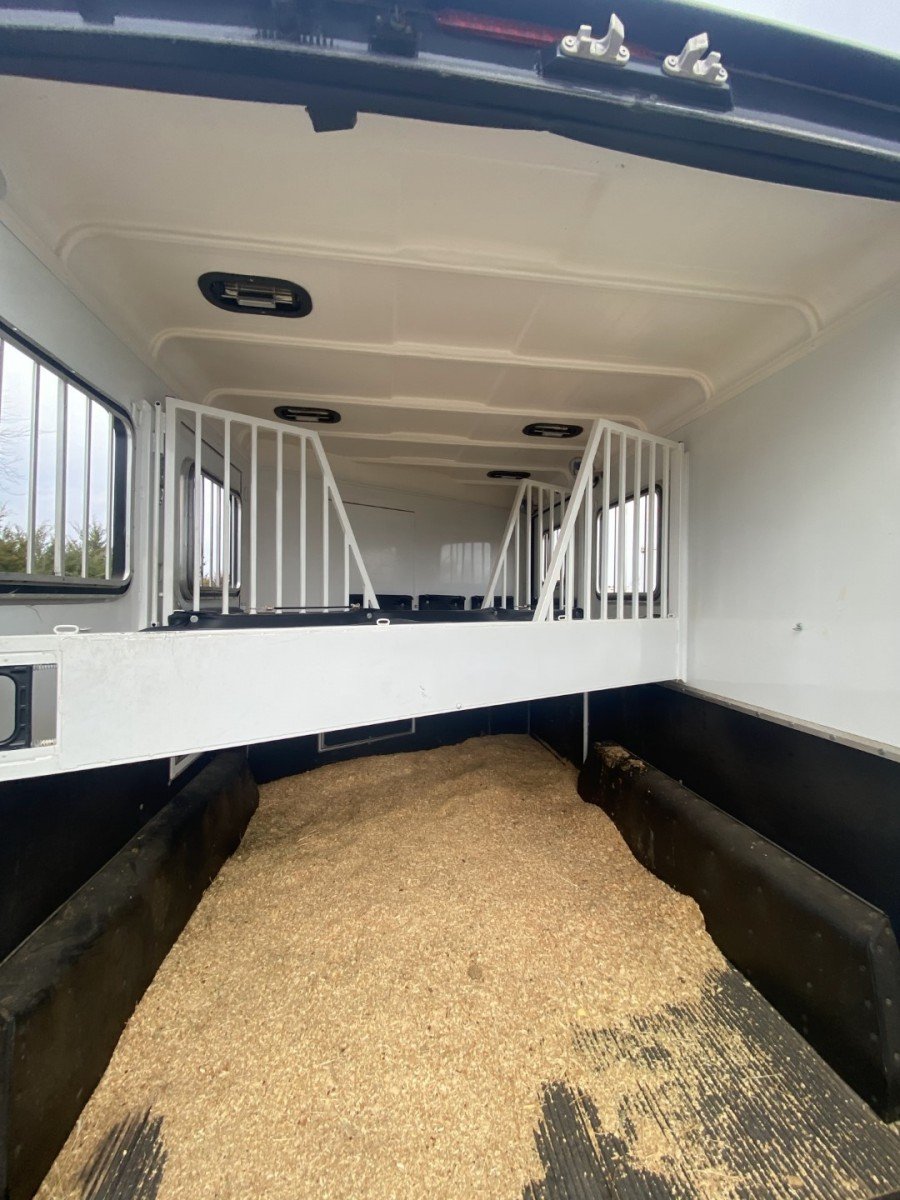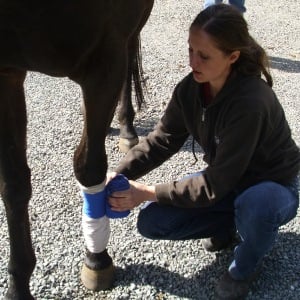Take the Stress Out of Traveling with Horses: Tips from a Veterinarian
Traveling with horses can be a lot of fun, but long-distance trips can quickly turn into a headache if your horse becomes stressed or road-weary. Whether you are hauling a small bumper pull or a big gooseneck trailer, it is very important to take the right precautions to make sure your horses stay happy and healthy during their extended rides.
Here are 10 traveling with horses tips from a veterinary expert to make sure you take the right steps the next time you travel cross-country with your equine friend.
Skip ahead here to read more about our vet expert, Dr. Hannah Mueller.

Tip #1: Make sure you have the right vaccines and paperwork to travel across state lines.
When you are hauling horses long distances, especially traveling with horses across state lines, documents are often required to prove your horse’s health and freeness from contagious diseases. The most common travel documents needed are a Health Certificate, Brand Inspection, and a negative Coggins test. Dr. Mueller of Cedarbrook Veterinary Care in Snohomish, Washington explained, “Rules and regulations are different state to state and can change without notice. It is important to discuss your travel plans with your veterinarian to determine what documentation is required for your trip.”
Since not all vets are Brand Inspectors, it would be best to check before you schedule an exam so the documentation can be done all in one visit.
Most states do not have vaccination requirements, but you should consider the region’s disease tendencies. For example, in Dr. Mueller’s home state of Washington, there has never been a documented case of Rabies. She said, “If your horse is traveling to the south or the east coast where Rabies is a real risk, your horses should be vaccinated prior to travel.”
Read more: How to Protect Your Horse from Viruses
Tip #2: Take the right steps to keep your horse well fed and watered during travel.
It is extremely important when traveling with horses that your horses remain well fed and hydrated on the trip. Dr. Mueller recommends a hay bag for each horse during travel. If your horse tends to eat very fast, you might consider a slow feeder type bag to minimize the risk of choking. Bring hay from your home barn for the trip and also enough to last for 1-2 weeks at their new location.
Since it can be difficult to have a ready supply of water available for your horse on the trailer, be sure to offer him water at each rest stop. Dr. Mueller said, “Electrolytes can help encourage your horse to drink and stay hydrated so I recommend orally dosing electrolytes (and probiotics for colic prevention) starting the day before, during and for a day or two after transport.”
Sometimes horses will refuse to drink water that tastes or smells different from their home water, so you should bring a tank of water along. If that is not possible, start feeding your horse flavored water a few days before transport so they get used to water that tastes a bit different. Continue adding the flavor during the trip. Flavorings (like apple juice) are not ideal because they contain excess sugar, but it is still more important to have your horse well-hydrated.
Some more ways to increase water intake include feeding soupy grass hay pellets, alfalfa pellets, or beet pulp mashes. Just be sure that you are careful when changing your horse’s feed because changes in feed can lead to colic.
Tip #3: Prevent ‘shipping fever’ while traveling with horses with these steps.
Any viral or bacterial respiratory infection can be known as ‘shipping fever’ and is characterized by a strong cough that can last for weeks after travel. Dr. Mueller explained, “It is common for horses who travel long distances that are immune suppressed or are highly stressed.”
There are a few ways to lessen the chances of getting sick:
-
Avoid transporting your horse alone. Bring a horse buddy along.
-
Make sure your horse can drop his head during travel to clear particulate matter from his respiratory tract.
-
Make sure your horse is healthy before travel and hasn’t been in contact with any sick animals.
-
Minimize your horse’s stress by ensuring the trailer is well-ventilated and at an appropriate temperature. Also, make sure your horse is given enough food, water, and rest breaks during the trip.
-
Dr. Mueller added, “Supporting your horse’s immune system with vitamin C or Echinacea can also help prevent shipping fever. Start treatment the day before, during, and for a few days after transport.”
Read more: Shipping Fever in Horses: Symptoms, Prevention and Treatment
Tip #4: Monitor your horse’s vital signs at each rest stop and after travel.
“You should closely monitor your horse’s vital signs to catch signs of stress, colic, or other illness early,” shared Dr. Mueller. Check the following at least twice daily or more frequently if your horse appears stressed: temperature (normal 98-101), pulse (normal 36-44), and respiratory rate (normal 8-20 breaths/min).
Next, you should check your horse’s hydration level by looking at their gum color and capillary refill time (CRT). A well-hydrated horse should have pale pink gums and the CRT should be less than 2 seconds. Check skin tenting by squeezing the skin on their neck or shoulder. It should bounce back readily when pinched. If either of these tests indicate your horse is dehydrated, take a prolonged break from travel until your horse can be re-hydrated.
Also, be on the look-out for signs of colic. If your horse is exhibiting abdominal pain-pawing, looking at their sides, is trying to lay down in the trailer or during breaks, is off their feed, or seems depressed, he may be at risk for colic. Listen for GI sounds on the sides of their abdomen. If colic is suspected, consult a veterinarian.
Tip #5: Pack a well-stocked travel first aid kit.
Dr. Mueller emphasized, “You should always travel with a complete first aid kit!”
This will include items like a stethoscope, thermometer, scissors, headlamp, bandage material, and wound treatment supplies. Also include medications and supplements like banamine (used to treat colic), bute, neo poly bac eye ointment, triple antibiotic ointment for wounds, electrolytes, probiotics, and echinacea.
In addition to your first aid kit, there are many other items you should consider loading into your trailer before hitting the road.
Read more: The Ultimate Equine First Aid Kit for Your Horse Trailer
Tip #6: Place bedding in the trailer to reduce leg stress while hauling horses long distance.
If you have an enclosed trailer, it is a good idea to include bedding in the trailer while traveling with horses. This will help the horse be more comfortable and decrease stress on their joints and feet during travel. It is not always a good idea to include bedding if you have an open stock trailer because dust stirred up by the wind can lead to respiratory and ocular problems. You also might consider placing a fly mask on your horse’s face if traveling in a stock trailer.
Tip #7: Take rest stops every 2-3 hours.
Breaks should be taken every 2-3 hours so that you can offer your horse water, refill their hay, and monitor their health. This time is also important so they can rest their legs from the constant balancing needed while the trailer is in motion. Dr. Mueller reminded, “Remember that trailering is exercise to your horse; they should be well conditioned and in good physical health prior to transport or else long distance transport can cause your horse to become very sore, tired, or their muscles can even tie up.”
Be sure to plan overnight rest stops where they can be turned out to stretch their legs and given a deeply bedded stall overnight.
Tip #8: Properly apply shipping boots for leg protection.
When a shipping boot is applied correctly, they can protect your horse’s legs from trauma during transport. Standing wraps can also provide support and help your horse’s legs from swelling up. Be sure to change the wraps daily and allow your horse’s legs to air out during long unloaded rest breaks. Watch for rubs or irritation from improperly applied wraps.
Dr. Hannah Mueller applies a leg bandage to a horse. Proper leg protection during travel can help minimize swelling in your horse’s legs and protect legs from trauma.
Read more: 7 Tips for How to Prevent Leg Injury in Your Horse Trailer
Tip #9: Make sure your horse trailer fits your horse and is in good working order.
A large horse crammed into a small trailer stall while traveling any distance is going to be very uncomfortable and agitated. Make sure that the horse trailer is appropriate for your type of horse. In addition, check the trailer carefully for sharp edges, worn tires, working brakes, operating tail lights, and structural damage.
Although there are many configurations for horse trailers, Dr. Mueller prefers designs where the horses can face the rear of the trailer at an angle. “This allows them to balance more effectively using their hind end.”
Read more: How the Reverse Haul Horse Trailer Design Helps Horses
Tip #10: Practice trailer trips so your horse is calm while traveling.
Dr. Mueller wrapped up by saying, “The key to keeping your horse happy and healthy during long trips is keeping your horse well fed and watered and making the trips as stress free as possible.”
This may require you to practice with your horse on smaller trips so they become accustomed to riding in the trailer. If your horse still seems stressed out on the trailer, consider an herbal calmer like Tranquility Blend, Dynamite Relax Spray, or Rescue Remedy to help take off the edge.
Meet our Expert: Dr. Hannah Mueller of Cedarbrook Veterinary Care in Washington State.
Dr. Mueller is a holistic equine veterinarian in Snohomish, Washington. She is the owner of Cedarbrook Veterinary Care and co-founder of the Northwest Equine Stewardship Center (NWESC). This organization works closely with the SAFE Horse Rescue to provide rehabilitation services to rescued horses suffering from starvation and neglect. NWESC also serves as an education and Equine Facilitated Psychotherapy and Learning (EFL) center.
Dr. Hannah Mueller operates out of Snohomish, Washington and takes a holistic approach with her veterinary patients.
Dr. Mueller uses a holistic approach to treat her equine patients. This means she considers all aspects of the horse’s lifestyle, nutrition, and environment when prescribing treatment. Her practice uses alternative medicine techniques like acupuncture, chiropractic, herbs, essential oils, energy work, and Theraplate as well as Western medicine techniques like advanced equine dentistry, digital x-ray, labwork, and physical therapy.
Dr. Mueller explained, “I take a holistic approach to my own life and feel that it is our duty as horse stewards to do what we can to help the horses that are suffering in our communities and be a part of positive change I am proud of Cedarbrook Veterinary Care and NWESC and all of our accomplishments including being an integral part of the healing of hundreds of rescue and non-rescue horses, educating both horse owners and future veterinary professionals with hands on and group learning clinics, and providing life changing healing for people through our EFL program.”
It is incredibly important that you take the proper precautions when traveling long distances with your horse. These ten steps will help you make sure that your next journey is filled with happy memories instead of constant headaches. To learn more about Dr. Mueller’s work, visit www.cedarbrookvet.com and www.nwesc.org.
Frequently Asked Questions
How long can you travel with horses?
In general, the max amount of time that you would want to leave your horses in a trailer while traveling is 9 hours.
How long can you travel with a horse without stopping?
While most horses can handle up to 9-12 hours of nonstop trailer time, it’s recommended to give them more frequent breaks such as every 6-8 hours.
What do you need when traveling with a horse?
The most important thing to have when traveling with horses in a trailer is a properly equipped equine first aid kit.





